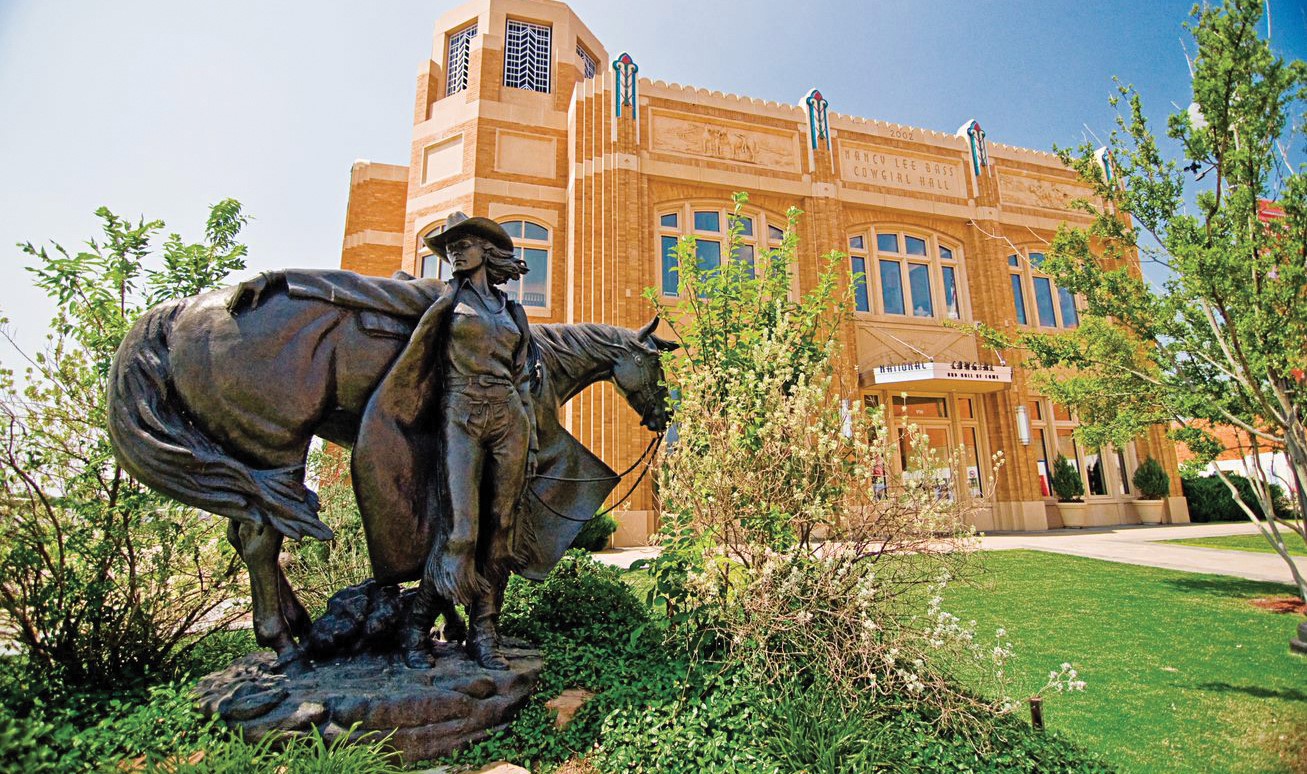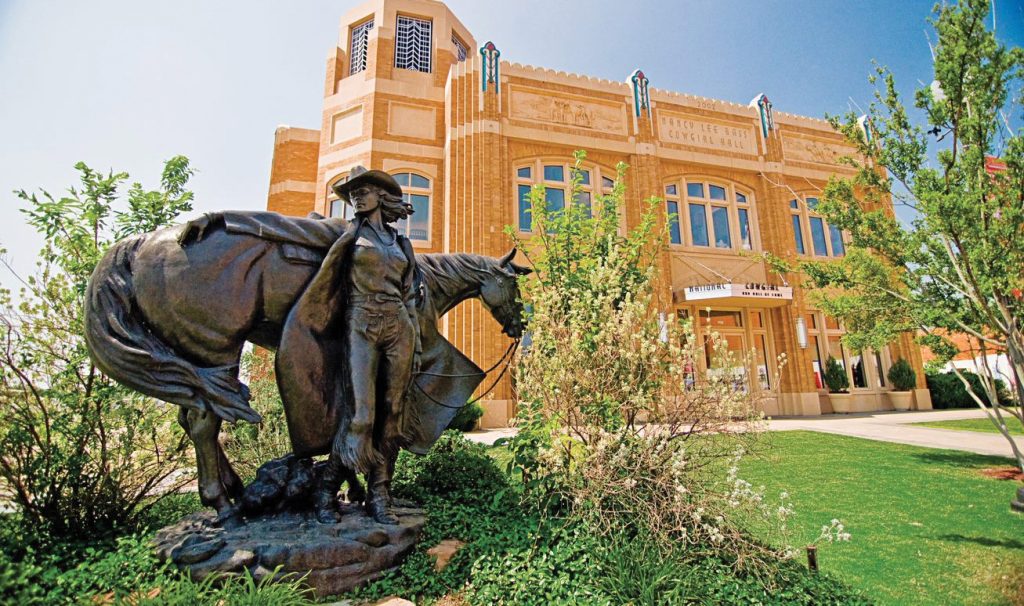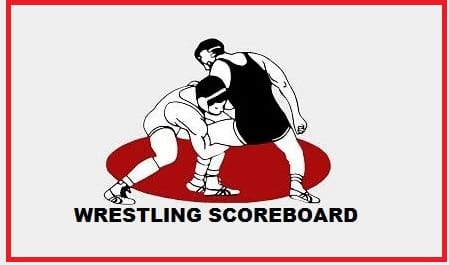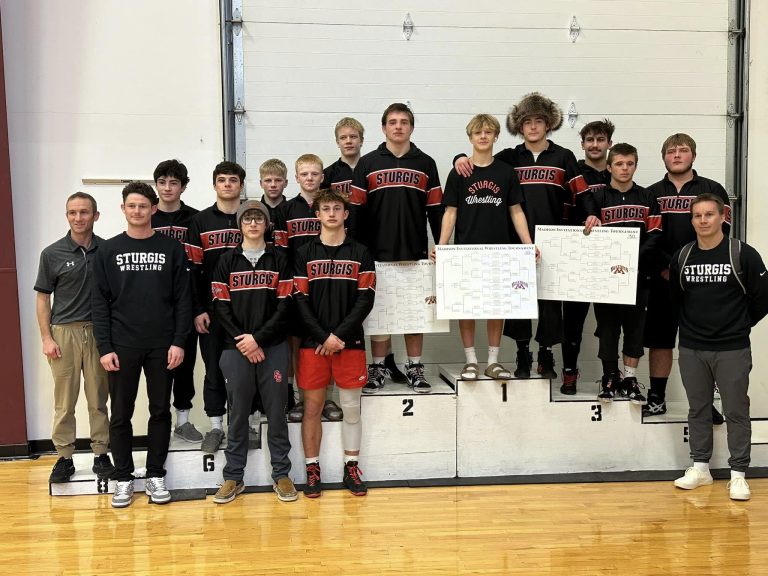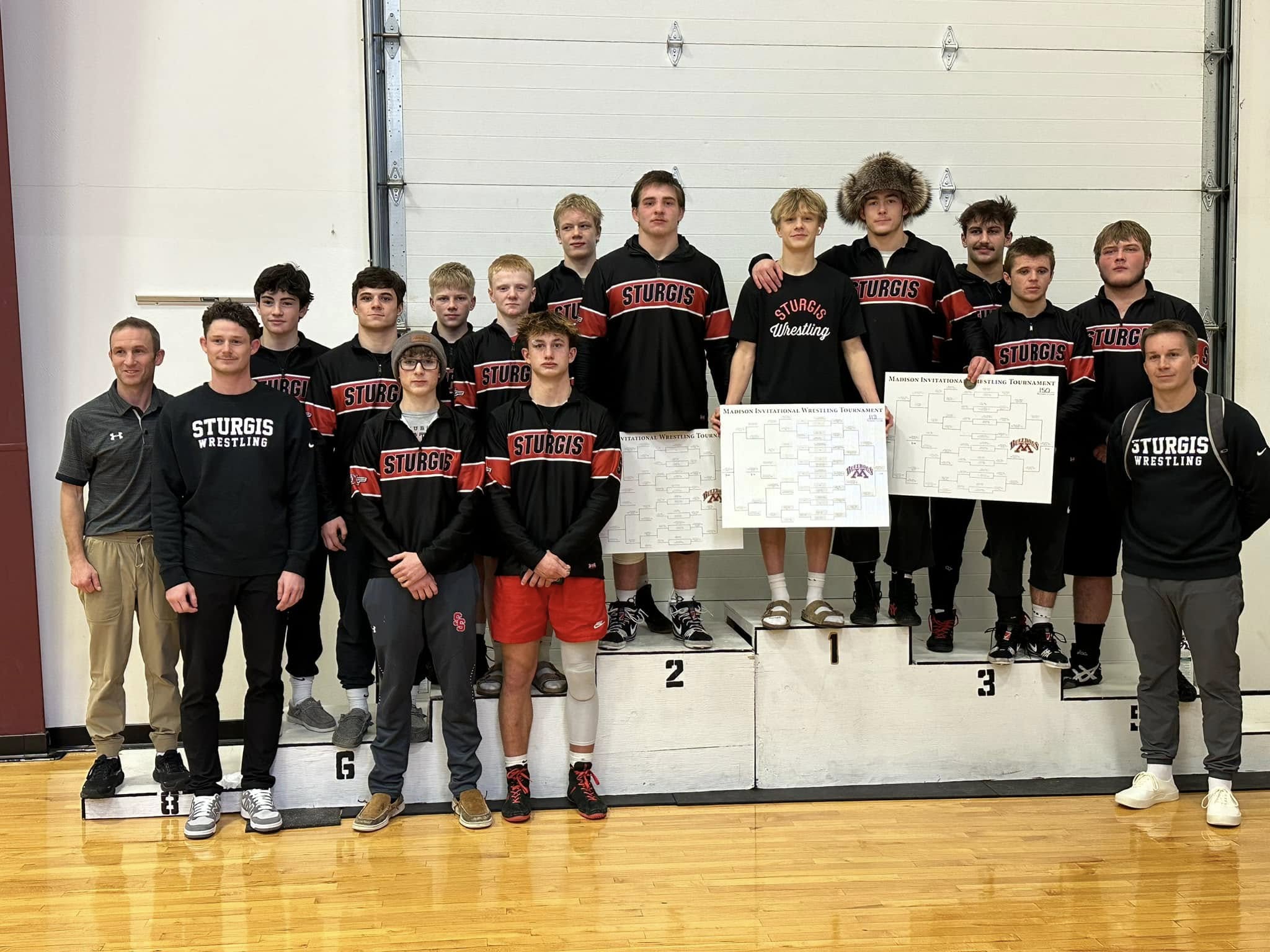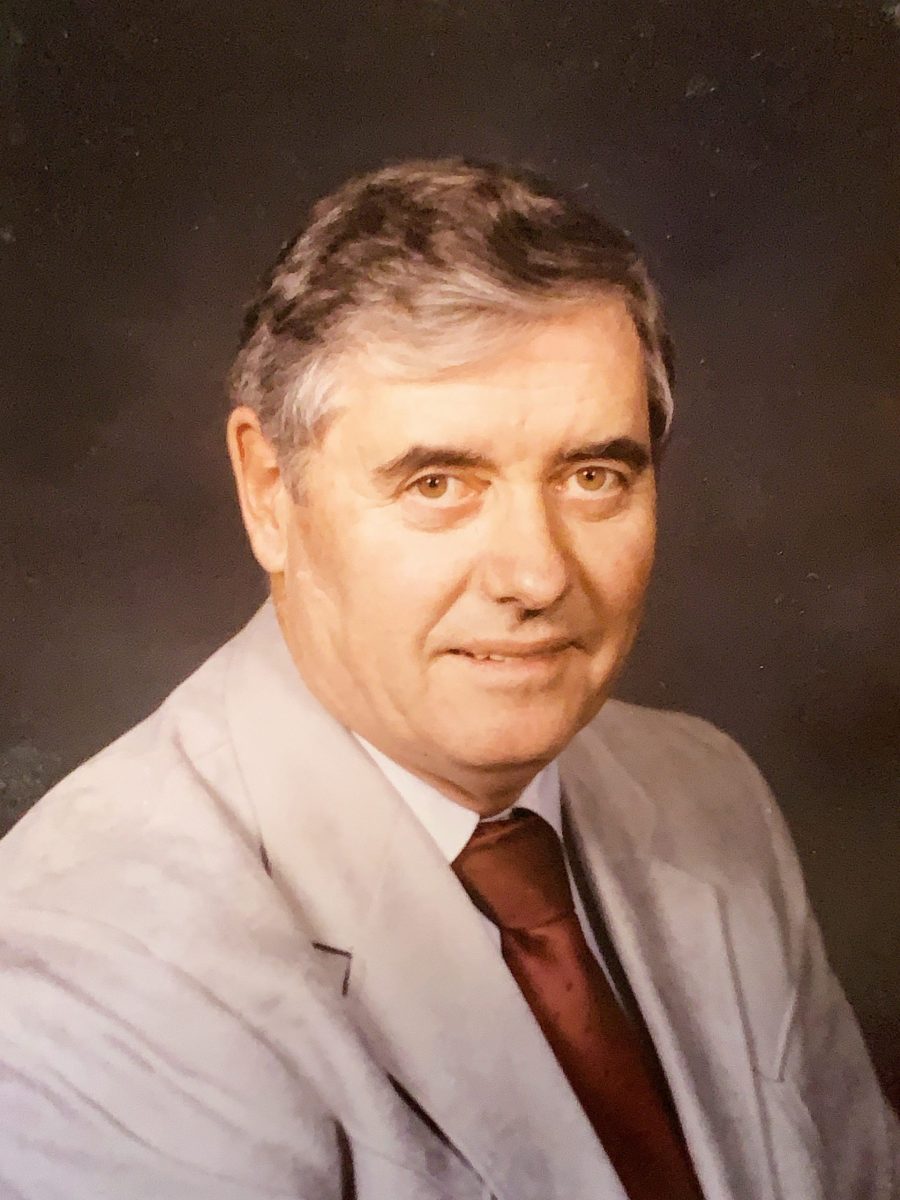Since before Oklahoma became a part of the Union, before the Great War, before the unsinkable Titanic sank in Arctic waters and before the Great Depression, women have been in the roping arena, and their historical feats are immortalized in the Cowgirl Museum.
*Accompanying photographs from the National Cowgirl Museum & Hall of Fame unless otherwise noted
Lucille Mulhall (1885–1940) Class of 1977

Mulhall did just that, and it’s reported her brother had to save her from an angry cowboy mob who suddenly doubted her femininity, though she was that, too. She was well educated, an accomplished pianist and a famous Vaudeville performer and producer, but when Theodore Roosevelt was a guest at the Mulhall Ranch and shared an interest in wolves, it was also Mulhall who took her good horse to go catch a live one and kill it with her bare hands as a gift to the soon-to-be president.
She was often billed as “the only lady roper in the world,” “champion lady steer roper” or “the world’s greatest woman roper,” and she won tens of thousands in prize money for feats like setting the world record in steer roping.
“Lucille roped, snubbed broncs and hazed for bulldoggers, but it was her direct competition, roping against the men, that set her apart and earned her the most respect,” wrote Tracey Hanshew in her 2014 article for “The Chronicles of Oklahoma” published by The Oklahoma Historical Society.
Prior to her untimely death in 1940, Mulhall performed and competed across a still-forming country and in Europe, and her successes earned her inductions into the Rodeo Hall of Fame in 1975 and into the National Cowgirl Hall of Fame in 1977. She was a member of the rodeo community and a competitive roper since rodeo’s very first iterations, and she undoubtedly played a role in paving the way for the next century of women ropers.
Isora DeRacy Young (1905–2012) Class of 1979

In her motherhood years, Young worked for “the Reeves County sheriff’s department, collecting taxes with a pearl-handled revolver at her side,” the state resolution reads. But, with her daughter grown, she again returned to rodeo and traveled the country with her husband, I. W. “Dub” Young, roping and running barrels.
In 2023, the WPRA celebrated the 75th anniversary of its first Girls Rodeo Association meeting, held Feb. 28, 1948, where Young was among the 38 ranch women who arrived in San Angelo to give rodeo’s better half an official place in the arena.
Jewel Frost Duncan (1902–1984) Class of 1976

After being ranch-raised near Kent, Texas, the young cowgirl entered her first rodeo at 18. In 1926, she married William “Kessie” Duncan and, together, they competed in calf roping through the 1930s. Hot off being crowned Rodeo Queen of the Pecos Rodeo in 1935, Duncan then claimed her World Champion Calf Roper title in 1936, earning her a contract to travel the country and demonstrate her roping skills to a whole new generation of rodeo fans.
As a testament to her lasting influence, not only was Duncan inducted into the National Cowgirl Hall of Fame in 1976 and the Texas Rodeo Hall of Fame in 2004, but in 2022, author Trey Armstrong published Jackrabbit Jewel and the Longhorn Cattle Drive, a children’s book about Pecos Bill moving his herd to Montana with the help of an enterprising young cowgirl named Jewel, a character inspired by a lady calf roper and cowpuncher from a century before.
Blanche Altizer Smith (1928–1998) Class of 1976

Smith, older sister to the PRCA’s 1959 World Champion Calf Roper Jim Bob Altizer, was perhaps of the first generation of women ropers who got to know the thrill of competing against their equals. At 16, she and 35 other women were entered to compete at the Midland Rodeo, a few hours from her home in Del Rio. As she spread her rodeo wings, competing in Nebraska and Oklahoma, she established herself as a top all-around competitor and, in 1950, she earned championship titles in calf roping, team tying and steer roping. Eventually, she became a three-time World Champion Team Roper.
Smith’s commitment to rodeo and her lasting impact are acknowledged in the actions of her nephew, Mack Altizer, who was one of the first rodeo producers to add women’s breakaway roping to his rodeos in West Texas. In 1976, Smith was inducted into the Cowgirl Hall of Fame and, in 2006, she became a member of the Texas Rodeo Cowboy Hall of Fame.
Wanda Harper Bush (1931–2015) Class of 1978

Like many of her predecessors, it wasn’t long before Bush was going toe-to-toe with the neighborhood boys and, then, the men in the arena, including a 1956 six-head calf roping match in which Bush beat Pete Taylor by 21.1 seconds in San Angelo, long before Billie Jean King’s 1973 “Battle of the Sexes” tennis match in Houston received worldwide acclaim and spurred Title IX into action.
“It was not a story known far and wide because the humble cowgirl just went in there, took care of business and then moved on,” notes the ProRodeo Hall of Fame, which inducted Bush in 2017—the first time women (Charmayne James was also inducted in 2017) from a competitive rodeo category were extended the honor.
Like her contemporaries, Bush was a founding member—No. 14—of the Girls Rodeo Association. She was instrumental in developing the organization into today’s WPRA and played a pivotal role in the battle for equal money in the ‘80s. Throughout her time competing, she established herself as the most decorated cowgirl in the history of women’s rodeo with 32 world titles across the all-around (9), barrel racing (2), cutting (2), flag racing (1), ribbon roping (7) and calf roping (11) categories.
Bush became a Cowgirl Hall of Famer in 1978 and, in 1988, the WPRA recognized her as their Pioneer Woman of the Year. She was inducted into the National Rodeo Hall of Fame in 2001 and into the Texas Cowboy Hall of Fame in 2005.
Betty Dusek (b. 1931) Class of 2010

“We were tired of not getting our due,” she told The Team Roping Journal in a 2023 interview.
Dusek turned 93 on March 1. She might not throw a mean loop like she did to become a 14-time world champion, but she’s still getting horseback. A true all-around cowgirl, Dusek won titles in calf roping, flag racing, ribbon roping and team roping. Her first year in the GRA resulted in her becoming the World Champion Calf Roper and, in true rodeo-lifer fashion, she won her last saddle when she was 75.
Like Dusek, her horses were also all-around talents. A filly she won in competition at the age of 16 was made to be a top ranch horse and rodeo horse. When Wanda Harper Bush mounted out on Dusek’s good mare in 1953, Bush won the world in barrel racing. And in 1967, Dusek rode a single, multi-talented horse all the way to her All-Around championship title.
Dusek was inducted into the National Cowgirl Hall of Fame and the Texas Rodeo Cowboy Hall of Fame in 2010.
Betty Gayle Cooper-Ratliff (1952–1999) Class of 1987

Such a standout youth talent was Betty Gayle Cooper-Ratliff that she was awarded the first-ever college rodeo scholarship offered to a woman. A New Mexico native, she competed for Eastern New Mexico University from 1971 to 1975 and proved a worthy investment by winning two national championships, three Southwest National Intercollegiate Rodeo Association titles and the university’s Outstanding Woman Athlete Award.
Cooper-Ratliff was born in 1952, the daughter of Hall of Fame roper Tuffy Cooper—who helped organize the NIRA in 1948—and was raised alongside her eventual Hall of Fame brother, Roy Cooper. With a heart for the cross-section of athletics and academia, Cooper-Ratliff began her coaching career at the high school in Lovington before, just a year later, taking the rodeo coach position at Southeastern Oklahoma State University in 1976.
While working toward her master’s degree, Cooper-Ratliff took the men’s team to five NIRA championships and the women’s team to four, not to mention the dozens of student-athletes who won individual titles in her care, setting a national record for a rodeo team coach. She remained the university’s coach until her 1999 death, all the while achieving greatness in the GRA/WPRA.
Cooper-Ratliff joined the GRA in 1975 and went on to win nine world championship titles in the all-around, calf roping, goat tying and breakaway roping, and she became the WPRA’s first Pioneer Award recipient when she was inducted into their Hall of Fame in 1996. She became a member of the National Cowgirl Hall of Fame in 1987, the Lea County Cowboy Hall of Fame in 1998 and was awarded the Lane Frost Memorial Award in 1999.
Pam Minick (b. 1955) Class of 2000

Unlike many of her roping contemporaries, Pam Minick was not raised as an all-around ranch hand. Instead, her equine ambitions were learned aboard a pair of $300 horses her parents bought her and her sister that were trained to pull a wagon down the Las Vegas strip. The horse hook was sunk, though, and it wasn’t long before Minick was competing in 4-H and high school rodeo.
She proved a quick study, once winning each of her eight 4-H classes (four show, four timed) and going on to become the first woman awarded the Nevada Cowboy Association’s Rookie of the Year title. Competitively, Minick thrived in the barrel racing arena, which made her a great candidate to become the Turquoise Circuit Director and the WPRA Vice President, but her roping chops require no fluffing, either. Minick was a 16-time Women’s National Finals Rodeo qualifier, and she won the Women’s World Championship Calf Roping title in 1982.
Perhaps the most pivotal event in Minick’s life, however, was becoming Miss Rodeo America in 1973. Already accustomed to the demands of rodeo travel and the public relations work she was doing for one of the hotels, Minick took to making public appearances and promoting rodeo like a pro, and that’s what she became. In 1976, Minick was asked to join rodeo superstars Donny Gay, Larry Mahan and Jim Shoulders to cover the live rodeo broadcasts on CBS—one of just three television networks at a time when it wasn’t unusual for 1.2 million people to tune in.
In a true league of her own, not only was Minick the first woman to ever commentate a rodeo on national television, but among her cowboy companions, she was often the best pick to cover the team ropings, which she did for many of the NFR broadcasts on ESPN in the 1980s.
Minick remains an icon and a mentor for women in rodeo today. In 1998, she was awarded the Tad Lucas Award from the National Cowboy & Western Heritage Museum and, in 2000, Minick was inducted into the National Cowgirl Hall of Fame. Pam and her husband Bob were inducted into the Texas Cowboy Hall of Fame in 2004 and then the Texas Rodeo Cowboy Hall of Fame in 2011. Most recently, Minick received the first-ever Lifetime Achievement Award from the Women’s Rodeo World Championship in 2023.
Lari Dee Guy (b. 1971)
Class of 2021

Beginning at age 9, Guy began earning 11 consecutive American Junior Rodeo Association roping titles. During her college years she claimed two CNFR championship titles in the breakaway and, before joining the WPRA in 2005, she became a finals champ and year-end champ in both the Texas Circuit Rodeo Association and the United Professional Rodeo Association.
Upon joining the WPRA, it wasn’t long before Guy began taking names at the World Finals, claiming eight World Champion buckles between 2007 and 2014 in the all-around, breakaway and team roping. Roping during the All-Girl heyday of the same era, Guy threw down at the jackpots to become the 2009 USTRC Finals All-Girl Champion Heeler, the 2010 Wildfire Open to the World All-Girl Champion Heeler, the 2011 Spicer Gripp Memorial Champion Header, the 2012 Windy Ryon Champion Heeler and, in 2013, the Wildfire All-Girl Champion Header.
Also in 2013, Guy launched the “Rope Like A Girl” campaign to inspire the next generation of female ropers. In the decade since, the campaign evolved into a full-blown 501c3 to provide real support and solutions for women through roping.
In lockstep with Guy’s efforts and efforts like hers, the breakaway roping scene underwent exponential growth in those same years, leading to the inaugural National Finals Breakaway Roping in 2020—an event Guy qualified for along with her fellow Top 15 professional ropers in the sport.
On the occasion of being inducted into the Texas Cowboy Hall of Fame in 2020, Guy told The Team Roping Journal, “My goals are to keep elevating the sport.”
